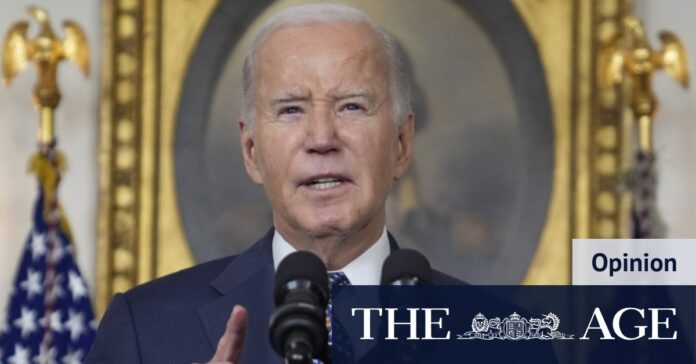[ad_1]
But break the numbers down, and there is much less to celebrate: the Index (which can range from +100 to -100 depending on how respondents answer) currently sits at -26. The small recent uptick was largely driven by the views of just over a quarter of respondents in January describing the economy in positive terms (5 per cent as “excellent” and 22 per cent as “good”). A massive 63 per cent of respondents said the economy was getting “worse” last month, down from 68 per cent in December.
If you’re the President, these figures are not encouraging – not least because it’s near impossible to imagine just how much better the headline economic indicators could get ahead of November’s election.

The US is still grappling with high inflation. Credit: Bloomberg
What explains the gap between such positive economic data in America and relatively negative sentiments? This has been a lingering question in US politics, with many trying to explain it away as a “vibe-cession” – the idea that people don’t feel well-off trumping any sense of the actual figures.
But feelings of being worse-off aren’t made up. Major mistakes have been made at the national level, including Biden and his team insisting that the Inflation Reduction Act has tackled the problems of inflation, while Americans are still reeling from the higher prices. Many are misguidedly waiting for prices to drop – an ugly consequence of the administration never properly explaining to voters the long-term impact of inflation, and that inflation coming back to target still means prices are rising.
But many of the negative feelings seem to stem from worries about the future, as Americans refuse to settle into the idea that economic growth will be sustained. The Wall Street Journal’s deep dive this week into the mismatch of the numbers and sentiment revealed that, for many Americans, “long-term financial security feels fragile and vulnerable to wide-ranging social and political threats” including wars abroad and messy politics at home.
This, perhaps, explains why – despite his booming economy – Biden is even with Donald Trump in the most recent polls, and in some cases falling behind.
A glance at the polls would tell you that voters are not anywhere near as confident about the future of the economy as the current figures suggest they should be.
It is hard to separate voters’ trepidation about economic oversight in the future from their nervousness about what the next four years look like for the president. A recent poll from NBC found that 76 per cent of voters, “including half of Democrats, say they have concerns about President Joe Biden’s mental and physical health”.
Extraordinarily, that figure is higher than the 61 per cent who worry about the legal charges against Trump. The special counsel report published this week with details on Biden’s health will not help matters, having flagged “significant limitations” in his memory.
Loading
Perhaps the best news for Biden is that how Americans report they are feeling about the economy and how they are acting tell different stories. Consumer sentiment is up by almost 30 per cent since November, according to the University of Michigan – a strong indicator for how Americans will vote in an election. It’s currently around the same levels as it was in 2020, when Republican support across the US (with the exception of the presidency) was much stronger than expected.
It seems Biden’s biggest economic task for the next nine months is to convince voters that oversight of the economy will remain in capable hands for another four years.
The economic data may be in his favour, but the polls suggest he has a lot of persuading to do.
Telegraph, London
[ad_2]
Source link


